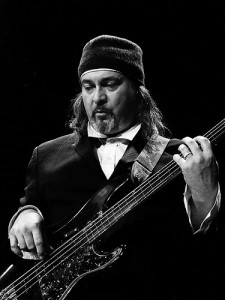Bill Laswell: Famed Bassist/Producer

photo by Michael Hoefner
Mention any major drummer of the past forty years, and Bill Laswell has shared a stage, studio, or rhythm section with him or her. Here the bassist/producer/remix engineer gives us his personal impressions of Tony Williams, Ginger Baker, Elvin Jones, Zigaboo Modeliste, Jack DeJohnette, Zakir Hussain, and more.
MD: How authoritative was Tony Williams as a player?
Bill: Everything we did was done in one or two takes. We worked on many recordings together. I always set it up in the studio so it wouldn’t be much of a stretch for him to just be himself. You didn’t hire Tony Williams to play like someone else. You hired Tony Williams because you wanted Tony Williams. The reason I met him in the first place, in 1983, was because Tony had heard the Herbie Hancock album [Future Shock] and wanted to do something different himself. He was a total musician, an undeniable presence.
MD: What was so special about the way Williams played?
Bill: Tony was someone who started very young, and he immediately established a signature voice. To me he’s more like a planet than a player.
MD:He was a musical force.
Bill: And very versatile. From the first cymbal pattern you hear, you know immediately who’s playing. I don’t like using the word favorite, because you want to have the luxury of being able to change your mind. But I’ve never been able to change my mind about Tony Williams. He’s pretty much, for me, the definitive drummer. Advertisement
MD: What about Ginger Baker?
Bill: He is the only drummer I’ve worked with who kept his identity, sounded like Ginger Baker, when I was working in various rock configurations. It is undeniable. His playing won’t fit into just any kind of music. That’s not why he plays drums. Versatility is not the key. But his originality and presence? They’re unique. Also, the influence of African drumming was prevalent in his playing, which you don’t find in a lot of rock drummers. Jerry Marotta, the same thing. You know he’s heard a lot of African and world music.
MD: Elvin Jones?
Bill: I worked [as a producer] with Elvin Jones on a record for Sonny Sharrock [Ask The Ages], and Pharoah Sanders was on it. Elvin was similar to Ginger. If you’re going to work with Elvin, you’d better get a bass player who listens. Charnett Moffett was the bassist for that record, and he was young at the time and was able to listen very closely. So it helped put the music together.
MD: Zakir Hussain?
Bill: The greatest rhythm player I’ve ever experienced. He’s not a drummer—he’s a tabla player. But he’s someone who deals with layers of rhythm, simultaneous improvisational structure, everything all at once. The absolute best at generating rhythm. Advertisement
MD: Who would be a drummer concerned with keeping time?
Bill: Well, there’s a lot. Sly Dunbar keeps time. Style Scott. Ziggy Modeliste plays time—his own time. He definitely brings his own individualistic feel to the table. English drummer Charles Hayward. Brain [Bryan Mantia] is very good for keeping time and for spreading energy around. I’ve played with a lot of drummers who’ve played free, like Milford Graves, Rashied Ali, and someone like Jack DeJohnette, who can do both. No two of them are the same.
MD: Jack DeJohnette always came across as a very “clean” drummer.
Bill: That’s a good word. It’s the cymbals, I think. Jack, like Tony, has a certain sound, and when you hear the cymbals you pretty much know who it is. He was always conscious of his sound. And he’s had a lot of experience. His playing is being filtered through all these different experiences. Because he’s a composer, he’s conscious of building music and not just blowing somebody out. He’s more interested in being part of the music while being conscious of his own individual sound.
Will Romano


